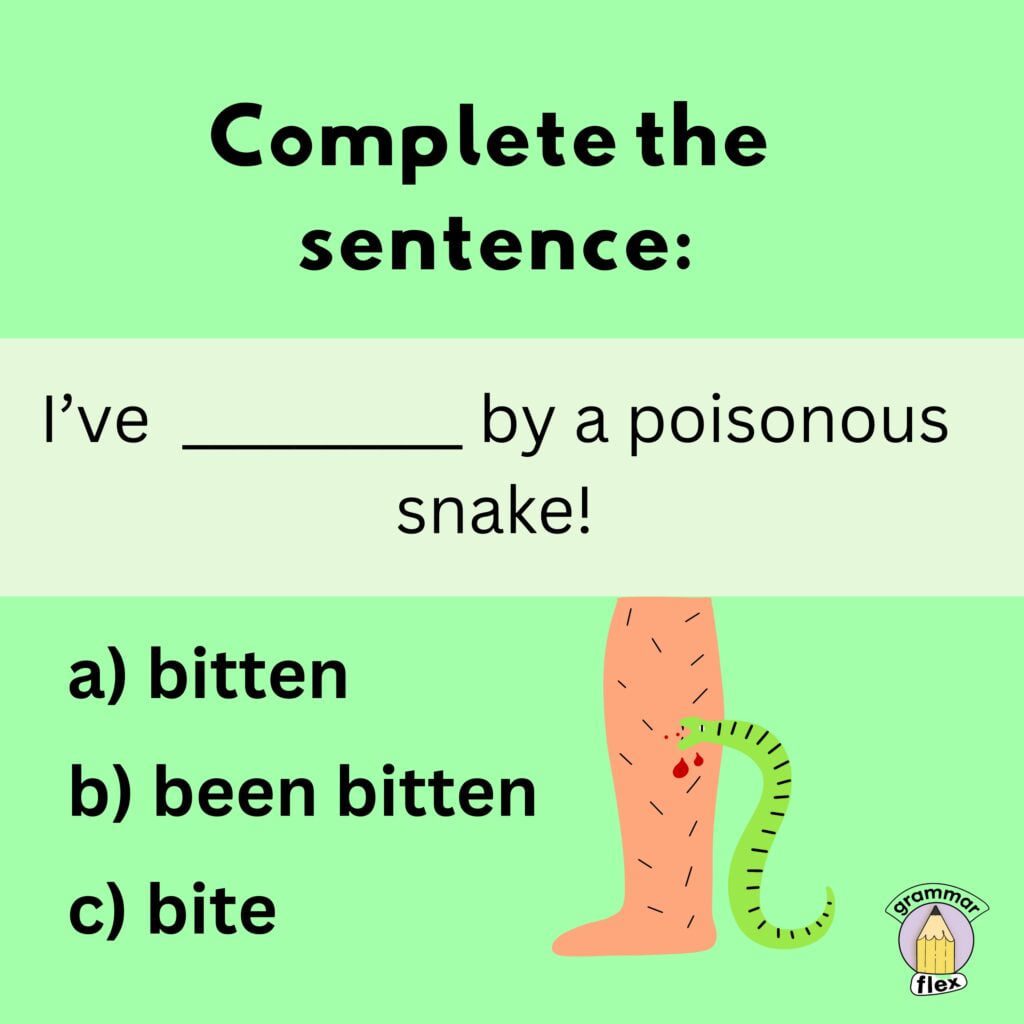
Get a bite of this grammar lesson on proper verb forms!
What’s the past tense of “bite”?
The verb and action of biting (present participle) describes when we use our teeth to cut into or through stuff, usually food . . . like when you bite into a sandwich (present tense). Continue reading for the key takeaways on the irregular verb (though highly regular action), to bite.
Verb forms of “bite”
- Bite is an irregular verb (i.e., it’s present past future tenses don’t end in -ed).
- Bit is the simple past tense of bite.
- Bitten is the past participle form of bite, used in perfect/continuous tense constructions.
| Present | Past | Future | |
|---|---|---|---|
| Simple | I bite | I bit | I will bite |
| Continuous | I am biting | I was biting | I will be biting |
| Perfect | I have bitten | I had bitten | I will have bitten |
| Perfect Continuous | I have been biting | I had been biting | I will have been biting |
Irregular verbs similar to “bite”
See the following chart of verbs with different forms in the present, past and as a past participle, (like bite/bit/bitten).
| Base verb | Past tense | Past participle |
|---|---|---|
| do or does | did | done |
| write | wrote | written |
| bite | bit | bitten |
| eat | ate | eaten |
| hide | hid | hidden |
| ride | rode | ridden |
When to use “bit” or “bitten”
Your dog bit me!
I had bitten into the cake while no one was looking.
The past participle form of a verb, (e.g., bitten) conjoins with auxiliary verbs hadto form the past perfect. When auxiliaries or helper verbs, had and been, are in the same sentence as the main verb, this indicates a perfect or progressive tense, and not a simple tense.
The past perfect tense is constructed by had [auxiliary] + bitten [past participle]. The simple past tense doesn’t use a helper verb (or auxiliary), so this makes differentiating between them straightforward.
“Bite” / “bit” / “bitten”, used in sentences
| Verb: bite/bit/bitten | Example sentences |
|---|---|
| Bite |
Some people bite their nails when they feel nervous. Mosquito bites sometimes itch for days. He was curious about how it would taste, so he took a small bite. |
| Bit or bitten |
The hamster bit the child. She was badly bitten by the dog. Has your dog ever bitten anyone? |
Idioms/phrases with bite
| Phrase | Meaning |
|---|---|
| to bite one’s tongue / hold one’s tongue | To refrain from speaking in order to avoid offending. |
| your bark is bigger than your bite | Someone seems threatening but isn’t actually dangerous. |
| to grab a bite | To get something to eat. |
| don’t let the bed bugs bite! | A way to say goodnight or sleep well. |
| to bite your nose to spite your face | To seek revenge in a way that hurts oneself more. |
| don’t bite off more than you can chew | Don’t take on more than you can handle. |
| don’t bite the hand that feeds you | Don’t mistreat those you depend on. |
| how do you eat an elephant? One bite at a time. | Tackle big tasks by doing one part at a time. |
Origin of the verb bite
Old English bitan “to pierce or cut with the teeth” (class I strong verb; past tense bat, past participle biten), from Proto-Germanic *beitanan.
Practice: “Bite” conjugations
The dog ______ the mailman yesterday.
She has been ______ by mosquitoes all summer.
Don’t let the dog ______ you!
He was ______ by a snake while hiking.
When she was a child, a horse ______ her finger.
FAQs
What is the simple past tense of bite?
+
What is the past participle of bite?
+
How do I choose between bit and bitten?
+
Is “He bitten off more” correct?
+
Is bite a regular verb?
+
Sources
-
1. Harper, Douglas. “Etymology of bite.” Online Etymology Dictionary, https://www.etymonline.com/word/bite. Accessed 16 January, 2023.
Advertisement








.webp&w=3840&q=75&dpl=dpl_13tcGbrn5BXPQFsQmuQWqib9Y3DN)